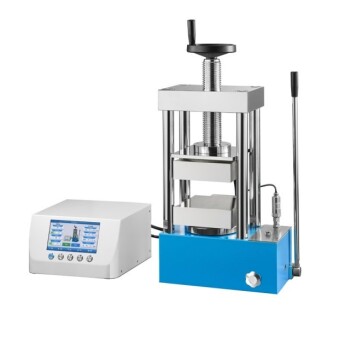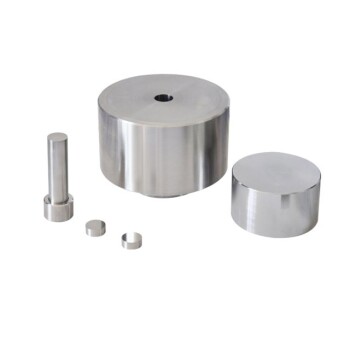In material testing, a hydraulic press serves two fundamental purposes. It is used to directly test a material's mechanical properties by applying a precisely controlled compressive force, and it is used to prepare uniform material samples for subsequent analysis with other instruments. These dual roles make it an indispensable tool in quality control, manufacturing, and materials science research.
The core function of a hydraulic press in a lab setting is not just about applying force, but about applying a quantifiable and repeatable force. This allows researchers and engineers to either simulate real-world conditions to test material limits or create perfectly consistent samples for other analytical techniques.

The Two Primary Roles of a Hydraulic Press
A hydraulic press's utility in a laboratory environment can be broadly categorized into two distinct but related functions: direct material testing and precise sample preparation.
Function 1: Testing Mechanical Properties
The most direct application is to subject a material to force and observe its response. This provides critical data on how a material will perform under stress.
Simulating Real-World Conditions A press can simulate the forces a material might encounter during its operational life. By applying a specific load, testers can evaluate properties like strength, durability, and ductility to ensure the material meets design specifications.
Determining Critical Failure Points Researchers use presses to push materials to their limits. This helps determine key metrics like elasticity (the ability to return to its original shape), plasticity (permanent deformation), and the ultimate fracture point.
Assessing Specific Performance Metrics Hydraulic presses are used for specialized tests. For example, in the printing industry, a press tests blocking resistance by pressing a printed material against itself to see if the ink causes it to stick, ensuring quality in stacked or rolled goods.
Function 2: Preparing Samples for Analysis
Often, the press is just the first step in a longer analytical process. Its role is to create a sample with the ideal physical form for another instrument to analyze.
Creating Uniformity for Spectrometry Techniques like FTIR (Fourier-transform infrared) or XRF (X-ray fluorescence) spectroscopy require extremely thin, uniform, and homogenous samples for accurate results. A hydraulic press is used to compress powdered material into a consistent pellet or thin film, eliminating variations that could skew the data.
Compressing Powders into Solid Forms For compositional analysis, it is crucial that a powder mixture is uniformly distributed. A press consolidates loose powder into a dense, solid pellet, ensuring that any subsequent test on that pellet is representative of the entire mixture.
Understanding the Trade-offs and Limitations
While powerful, a hydraulic press is not a universal solution. Understanding its limitations is key to its proper use.
Compressive Force is the Primary Action
A standard hydraulic press is designed to apply compressive force—pushing down on an object. While it can be adapted with jigs for some forms of tension or bending tests, dedicated machines for tensile testing (pulling) or torsional testing (twisting) are often more suitable for those specific applications.
Rate and Temperature Control are Specialized
A basic press controls the amount of force, but not necessarily the speed at which it is applied or the temperature. For advanced research, specialized hydraulic heat presses are required to study material behavior under combined pressure and temperature, which is critical for simulating many manufacturing and engineering environments.
Sample Preparation is a Means to an End
When used for sample preparation, the press itself provides no analytical data about the material's composition. Its sole purpose is to create a physically ideal sample. The accuracy of the final analysis still depends entirely on the subsequent analytical instrument (e.g., the spectrometer).
Applying This to Your Goal
Your specific use of a hydraulic press will depend entirely on what you need to discover about your material.
- If your primary focus is quality control: Use the press to apply specified loads to finished parts or material coupons to verify they meet the required strength and durability standards.
- If your primary focus is materials research: Use the press to explore a material's fundamental stress-strain behavior and identify its ultimate failure points under extreme pressure.
- If your primary focus is chemical analysis: Use the press to create consistent, homogenous pellets from powdered material to ensure you get accurate and repeatable results from your spectroscopic instruments.
Ultimately, the hydraulic press serves as a fundamental tool for translating abstract material properties into measurable, actionable data.
Summary Table:
| Function | Key Uses | Benefits |
|---|---|---|
| Testing Mechanical Properties | Simulate real-world stress, determine failure points, assess strength and ductility | Provides quantifiable, repeatable data for quality control and research |
| Preparing Samples for Analysis | Create uniform pellets for FTIR, XRF spectroscopy, compress powders for homogeneity | Ensures accurate, consistent results in subsequent analytical tests |
Enhance your material testing and sample preparation with KINTEK's reliable lab press machines! Whether you're in quality control, materials research, or chemical analysis, our automatic lab presses, isostatic presses, and heated lab presses deliver precise, repeatable performance for accurate results. Contact us today to discuss how our solutions can optimize your laboratory processes and drive your projects forward!
Visual Guide

Related Products
- Laboratory Hydraulic Press 2T Lab Pellet Press for KBR FTIR
- Automatic Laboratory Hydraulic Press Lab Pellet Press Machine
- Laboratory Hydraulic Press Lab Pellet Press Button Battery Press
- Manual Heated Hydraulic Lab Press with Integrated Hot Plates Hydraulic Press Machine
- Automatic Laboratory Hydraulic Press for XRF and KBR Pellet Pressing
People Also Ask
- Why is sample uniformity critical when using a laboratory hydraulic press for humic acid KBr pellets? Achieve FTIR Accuracy
- How is a laboratory hydraulic press used for polymer melt crystallization? Achieve Flawless Sample Standardization
- What role does a high-pressure laboratory hydraulic press play in KBr pellet preparation? Optimize FTIR Accuracy
- Why must a laboratory hydraulic press be used for pelletizing samples for FTIR? Achieve Precision in Spectral Data
- How do hydraulic press machines ensure precision and consistency in pressure application? Achieve Reliable Force Control for Your Lab



















